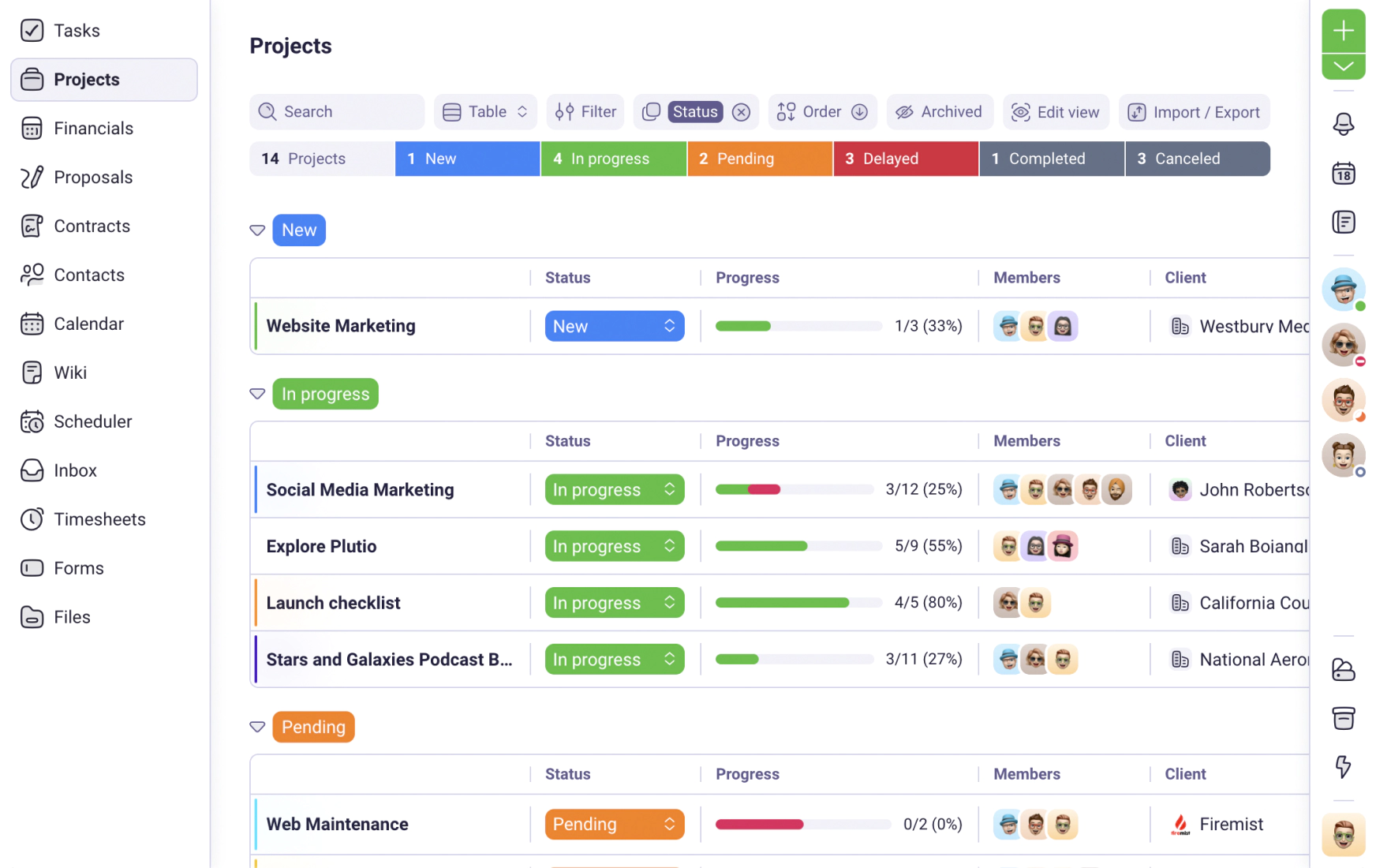We use cookies to personalise and enhance your experience.
Do you often feel like there aren’t enough hours in the day? Is your average workday calm and structured, or are you constantly frantic and stressed?
Knowing your priorities will make you more productive and save you from long workdays. But how do you effectively manage those priorities?
You might have a report to finalize, a Glip vs Skype comparison article to review, and multiple colleagues to chase down. All these tasks are important and need to be completed at some point. How do you decide what to do and when to do it?
Managing multiple priorities can be overwhelming, but it’s possible if you apply a method to the madness. This article will cover five methods for prioritizing your work tasks when they all seem urgent.
Create a Task List
You can use anything from a piece of paper to the best scheduling app in the world. No matter how you go about doing it, you need to make a list of everything that you have to do. These are the tasks and duties that you're responsible for on a daily, weekly, and monthly basis. This to-do list will help you prioritize your workload.
Don't forget to include things that arise throughout the day that you need to respond to. This includes phone calls, emails, and instant messages. Make sure that you take the time to write down as many of these as possible.
Sometimes it can be hard for you to think about the multiple projects you have going on and all of the various tasks that you need to complete. The important thing is for all of your goals to be clearly defined on the list. From here, you can write down all of the tasks that need completing in order to achieve each goal.
For example, the goal of your project may be robotic process automation implementation. You might devise a strategy to start with the most critical areas and expensive processes, then work outward to other areas.
It can help to work on the list steadily; keep it beside you for a few days. You can add to the list as you go about your day-to-day work life, and make sure that you've accounted for the things that are coming up most often.
Identify Urgent Tasks
If you're like most people, you're going to look at your task list and you're going to say that everything is urgent. Everything is important.
However, you need to be really honest with yourself. You can’t do everything at the same time, and there will always be some tasks that make sense to be put before others. Making good choices goes hand in hand with effectively prioritizing your time.
Take a look at your task list with a critical eye to determine what is truly important and what is truly urgent.
This includes things such as an urgent request from your boss, a client crisis, or a technical outage. These are all things that are both urgent and important for your company, as well as for your personal career success.
As you go down your list, especially as you reach the lower portion of it, you may notice a lot of tasks that seem important. In fact, they may be more important than some of the tasks which you are currently prioritizing. However, you need to make the distinction between important and urgent tasks.
The fires that you’re fighting on a daily basis are where you want to be focusing the bulk of your time and attention. A task on your list may seem important, but is it urgent? Does it need completing as soon as possible? If not, then it should be one of your lower priorities.
Deprioritize Time Sinks
Even when you already know the urgent tasks that you’re supposed to be focusing on, other things can seem to constantly take up your time. The isolated nature of remote work especially makes it easy to lose hours to your email inbox if you’re not careful. Prioritizing your work effectively includes managing such time sinks.
Time sinks are things that you spend time on at work, yet do little to actually move the needle in terms of your career growth or your company's long-term success. Things like responding to emails, voicemails, and team chats. These tasks are not important, but they need to be attended to within a reasonable timeframe.
Is there a different approach or strategy that you can take in order to de-prioritize these items? It could be as simple as having dedicated work blocks for checking your messages and responding to them.
It’s also important to consider things that are outright time-wasters. This includes checking your social media feed, watching cute animal videos, reading about the top 3 alternatives to Trello, and anything else that serves as a distraction from your task at hand.
These time-wasters are never put on our schedules or task lists because we know they aren’t driving productivity. They are forms of procrastination and make us feel guilty. However, if you find yourself unable to resist these mini-breaks, you should at least make room for them in your schedule. This way, you will have an accurate view of how your time is spent and can plan your day accordingly.
Schedule High Priority Tasks
Your highest priority work should be the tasks that have the most dramatic impact on both your personal and your company’s success.
These are tasks that shouldn’t be a surprise to you. They are tasks that are key to achieving your set goals, and you can plan for their completion accordingly.
To help with their prioritization, you should schedule time in your calendar at the beginning of the week to make sure that these are the things that you're actually focusing on. You can also write these tasks in your team calendar so that everyone can see what you’re busy with.
You don’t need to be overly specific or rigid in your scheduling. All workplace environments vary and it’s important to be able to adapt. Additionally, sometimes you just can’t be certain how long something's going to take.
However, by scheduling in advance, you know the key things that you are supposed to be working on and you know when you are supposed to be working on them. So when you find yourself with spare time because of canceled online meetings, you're never sitting around wondering “what should I be doing right now?”
You should also allow room in your schedule for unexpected events which need your attention. These events tend to be urgent, but you can’t necessarily anticipate them ahead of time. However, you can leave time in your day in order to deal with such potential surprises.
This is going to allow you to address them in a timely manner, without blowing aside every other priority that you already have.
Continuous Review and Reprioritization
Finally, you need to have an ongoing triage for your prioritization. Your task list is not finished once you complete all the tasks on it. There will, of course, be new tasks and situations which need attending to each day, week, and month.
In our modern world, especially in fast-moving industries, things change quickly. To stay productive, you need to adapt quickly too. You need to be able to review and reprioritize your competing priorities in order to focus your time on the right things.
For each task that falls onto your plate, you must properly take a look at it and assign it the correct priority. Once again, be honest with yourself about the true urgency and importance of the task at hand.
The more accurate you are in terms of defining your priorities and their urgency, the better you are going to be able to execute all of the things that you actually need to get done. This has the added benefit of helping you to see the things that you really don't need to be doing anymore.
When faced with a new, competing priority, there are three things that you should consider:
- How long is the task going to take?
- What impact will completing the task have?
- How quickly is the response needed?
If something is fast to do and has an extraordinarily high impact, such as renewing your online file storage subscription, it would make sense to prioritize it. You can get it out of the way first and de-prioritize the task that's going to take longer.
When in doubt, focus on the impact, and make that your top priority. Tasks that have a big impact on your company or clients are generally going to be more important than anything else.
Top Priority
If you apply these methods to your work schedule, you should experience a boost in productivity and notice a decrease in stress levels.
In a way, managing your priorities is always your top priority. Ensuring that your time and labor is being used wisely is one of the most important things you can do.
Your days will be a lot more structured as you take strides each day towards specific goals. You’ll also find it much easier to work from home productively as you will no longer be working reactively or waiting for instructions. Instead of reacting immediately to every new situation or request, you’ll be able to smartly insert them into your current list of priorities.
Have you tried Plutio yet?
The only app you need to run your business and get work done.
Try Plutio for FREESupercharge your business
The complete toolkit to run your business
The intuitive all-in-one solution to manage and collaborate on projects, share files, build forms, create proposals, get paid, and automate your workflow.
No credit card required


